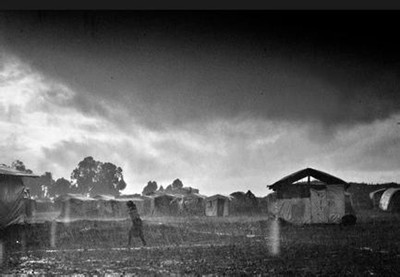閃電戰下的生活
Death threats
死亡威脅
Love and literature in the time of bombs
戰亂中的愛與文學
The Love-charmof Bombs: Restless Lives in the Second World War. By Lara Feigel.
FEW histories of the British home front during the second world warreally capture the “mood, temper and climate”, lamented Elizabeth Bowen, a novelist who lived in London at the time. Death's constant threat fuelled an apocalyptichedonism. The Blitz was grim, but glorious too, in its way. In addition, the experience left a distinct and enduring literary legacy, writes Lara Feigel,an academic at King's College London, in her new book, “The Love-charm ofBombs”, which came out in Britain in February and is now being published in America.
鮮有講述二戰期間英國大后方的故事能真正體現當時的“”心境、性情、風氣”,當年生活在倫敦的小說家Elizabeth Bowen哀嘆道。持續的死亡威脅燃起了享樂主義熱潮。閃電戰殘酷無情,但另一方面,這也是場榮耀之戰。此外,這次經歷也帶來了非同凡響不可磨滅的文化遺產,倫敦國王學院的學者Lara Feigel在她的新書《戰亂情迷》中寫道。該作品已于2月在英國面市,現于美國出版發行。

A fast-livingwriting trio Bowen, Graham Greene and Henry Yorke are the main protagonists. They mucked in with the wareffort, but their Blitz was made unique by love affairs. The passions it aroused, and the sense of timelessness that ensued a “suspended present”, Ms Feigel calls it were fertile muses. “These writers,firefighting, ambulance-driving, patrolling the streets, were the successors of the soldier poets of the firstworld war,” the author argues in her introduction.
三劍客 Bowen, Graham Greene 和Henry Yorke即是描寫這段放縱生活的主要代表。他們分享各自在戰時取得的成果,筆下的那些風流韻事也讓他們的閃電戰與眾不同。被喚醒的熱情以及時間的永恒性引發了一種 “現實靜止”,Ms Feigel形容為 靈感的源泉。“這些作家,當過消防員,開過救護車,在街上巡邏,是一戰時期士兵詩人的繼任者”作者在引言中陳述道。
Bomb-hit London was surely of a different order to the peerless carnage of Flanders fields, but the literary impact of the war, she convincingly shows, is comparable. Yorke was at his most prolific then. For the others the experience bore fruit more slowly. The Blitz would provide the setting for Bowen's “The Heat of the Day”, and also for Greene's most passionate work, “The End of the Affair”.
轟炸倫敦造成的傷亡雖沒有血流成河的佛蘭德戰役慘烈,但戰爭帶來的文學沖擊,卻不相上下,Feigel在書中有力地證明了這點。Yorke當時文思泉涌,而其他作家的產量相對偏少。閃電戰為Bowen的《炎日》,Greene最激情的作品《戀情的終結》提供了創作背景。
Peace was a disappointment. The democratic spirit ebbed and life lost its intensity. Bowen, repelled by the Labour Party's 1945 electionvictory, retreated to Ireland with her sexless husband, but really she lived in a world of letters with a Canadian lover. Yorke, who would never be more than a “writer's writer's writer”, became a drunk. Greene found new love and increased fame, but like the others, Ms Feigel suggests, he would never again “value the present moment so whole heartedly”.
和平令人沮喪。民主精神衰退,生活失去張力。1945年工黨贏得選舉,Bowen就此退出政治舞臺,與她性冷淡的丈夫一同移居愛爾蘭,但實際上她沉浸在與加拿大情人構筑起的情信世界。York,本可以超越“作家的作家的作家”,卻成了酒鬼。Greene有了新歡,聲名鵲起,但Feigel認為,就像其他人一樣,他再也無法“全心全意地珍視當下”。
This is a strikingly original book. It succeeds in itsambitious combination of group biography and literary criticism. But it is notflawless. Ms Feigel focuses too widely on obscure novelists,in particular a melancholy Austrian emigre, Hilde Spiel,while more illustrious contemporaries Virginia Woolf, Anthony Powell and EvelynWaugh haunt the background like ghosts at the feast. The authors are also tooreadily believed. Yorke called his fellow firefighters “absolute heroes”, butWaugh, a marine, doubted their courage. Did Waugh have a point? The questiongoes unasked.
這是本非常具有創建性的作品。它成功地完成了集體傳記與文學評論的宏偉結合。但也并非十全十美。Feigel過于專注冷門小說家,特別是憂郁的奧地利移民Hilde Spiel,而那些杰出的同代作家 Virginia Woolf, Anthony Powell和Evelyn Waugh 卻像鬼魂般游離在盛宴之下。同時,作者對一些史料過于輕信。Yorke稱他的消防伙伴“絕對是英雄人物”,但身為海軍的Waugh卻懷疑他們的勇氣。Waugh的話是否中肯,我們也不得而知。
But these are minor complaints. For the ageing Rose Macaulay, another British novelist of the period, the war was shattering. Shelost a secret lover to cancer, and his letters to a bomb. The need to conceal the mourning deepened the grief. “The Love-charm of Bombs” excels in demonstrating that these years of bleakness and loss were also, for a fortunate few, a time of extraordinary excitement and literary inspiration.
但這些都是小瑕疵。對于另一位英國小說家,當時年邁的Rose Macaulay來說,戰爭粉碎了一切。她失去了身患癌癥的秘密情人,炸彈摧毀了他們所有的情信。她必須隱藏這份悲傷,這反而加深了心中的痛楚。《戰亂情迷》極力證明了那個不斷失去的陰郁年代也是激情蕩漾,充滿文學啟發的時代,多么難能可貴。












